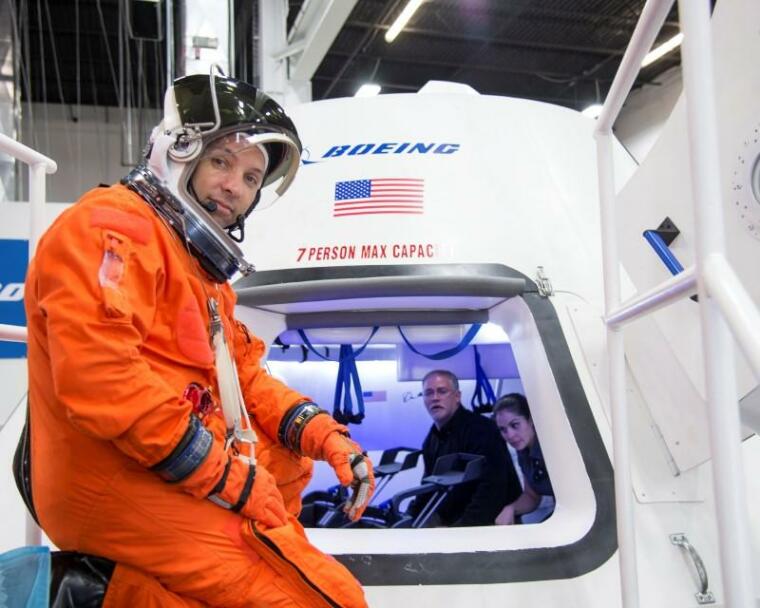Space Travel Could Accelerate Aging Of Astronauts' Immune System, Says Study

As human expeditions to Mars and asteroids are being planned, the latest research has shown that long-term space flight may make the human immune system age faster.
In a study published on Monday in the Journal of the Federation of American Societies for Experimental Biology, spaceflight was found to have negative effects on the immune system, PBS reported.
With programs such as Mars One looking to form a permanent human colony on Earth's neighboring planet, it is crucial for researchers to comprehend the likely effects of remaining in regions with little-to-no gravity for long periods of time, the study said.
Researchers found that mice exposed to low-gravity conditions have immune systems that are prematurely aging.
One important change has been noticed in the mice's bone marrow, which started to produce the B lymphocyte at levels similar to those of elderly mice. Lymphocytes are cells that create antibodies.
The study was not the first of its kind to point out this problem though. In August, research by NASA had 28 crew members from the International Space Station as participants. NASA's study showed that the immune systems of space travelers during spaceflight were "confused." Some cell functions were either depressed or heightened than normal.
The immune system, when cell activity is depressed, did not respond to threats, researchers said. They also observed that decreased cell activity leads to the reawakening of latent, or dormant, viruses in the body, but without symptoms of illness.
On the other hand, heightened cell activity can lead to increased allergy symptoms and persistent rashes.
"Things like radiation, microbes, stress, microgravity, altered sleep cycles and isolation could all have an effect on crew member immune systems," Brian Crucian, a NASA immunology expert, was quoted by PBS as saying. "If this situation persisted for longer deep space missions, it could possibly increase risk of infection, hypersensitivity, or autoimmune issues for exploration astronauts."
Both studies ended with a similar conclusion: Crew members must be prepared. The continued study of these immune system responses may give insights in countering such kind of immune changes either through drugs or spacecraft design.
 Christians don't have to affirm transgenderism, but they can’t express that view at work: tribunal
Christians don't have to affirm transgenderism, but they can’t express that view at work: tribunal Archaeology discovery: Medieval Christian prayer beads found on Holy Island
Archaeology discovery: Medieval Christian prayer beads found on Holy Island Presbyterian Church in America votes to leave National Association of Evangelicals
Presbyterian Church in America votes to leave National Association of Evangelicals Over 50 killed in 'vile and satanic' attack at Nigerian church on Pentecost Sunday
Over 50 killed in 'vile and satanic' attack at Nigerian church on Pentecost Sunday Ukrainian Orthodox Church severs ties with Moscow over Patriarch Kirill's support for Putin's war
Ukrainian Orthodox Church severs ties with Moscow over Patriarch Kirill's support for Putin's war Islamic State kills 20 Nigerian Christians as revenge for US airstrike
Islamic State kills 20 Nigerian Christians as revenge for US airstrike Man who served 33 years in prison for murder leads inmates to Christ
Man who served 33 years in prison for murder leads inmates to Christ


 Nigerian student beaten to death, body burned over ‘blasphemous’ WhatsApp message
Nigerian student beaten to death, body burned over ‘blasphemous’ WhatsApp message 'A new low': World reacts after Hong Kong arrests 90-year-old Cardinal Joseph Zen
'A new low': World reacts after Hong Kong arrests 90-year-old Cardinal Joseph Zen Iran sentences Christian man to 10 years in prison for hosting house church worship gathering
Iran sentences Christian man to 10 years in prison for hosting house church worship gathering French Guyana: Pastor shot dead, church set on fire after meeting delegation of Evangelicals
French Guyana: Pastor shot dead, church set on fire after meeting delegation of Evangelicals ‘Talking Jesus’ report finds only 6% of UK adults identify as practicing Christians
‘Talking Jesus’ report finds only 6% of UK adults identify as practicing Christians Mission Eurasia ministry center blown up in Ukraine, hundreds of Bibles destroyed: 'God will provide'
Mission Eurasia ministry center blown up in Ukraine, hundreds of Bibles destroyed: 'God will provide' Church holds service for first time after ISIS desecrated it 8 years ago
Church holds service for first time after ISIS desecrated it 8 years ago Burger King apologizes for 'offensive campaign' using Jesus' words at the Last Supper
Burger King apologizes for 'offensive campaign' using Jesus' words at the Last Supper Uganda: Muslims abduct teacher, burn him inside mosque for praying in Christ’s name
Uganda: Muslims abduct teacher, burn him inside mosque for praying in Christ’s name